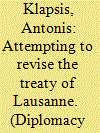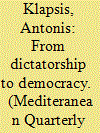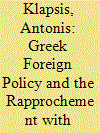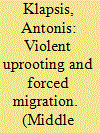| Srl | Item |
| 1 |
ID:
132412


|
|
|
|
|
| Publication |
2014.
|
| Summary/Abstract |
In June 1925, General Theodoros Pangalos imposed his dictatorship on Greece. During his 14-month rule, he set as one of his basic foreign policy goals the revision of the territorial settlement imposed on Greece and Turkey by the 1923 Treaty of Lausanne. Wanting to secure Eastern Thrace and possibly even part of Western Asia Minor for Greece, Pangalos sought the backing of at least one Great Power with interests in the region, in this case Italy, as its dictator, Benito Mussolini, remained equally hostile and aggressive toward Turkey. Pangalos tried to reach an understanding with Mussolini concerning the possibility of joint Greco-Italian action against Turkey. The first signs of closer co-operation came in early July 1925 when the Italian under-secretary of foreign affairs, Dino Grandi, visited Athens for discussions with Pangalos. However, a more important initiative involved the official visit of two Greek ministers-Loukas Kanakaris-Roufos, the foreign minister, and Anastasios Tavoularis, the transport minister-to Rome in early March 1926. They met with Mussolini who, because of British pressure, now seemed reluctant about Pangalos' ambitious plans for joint action against Turkey. The Greek leader's hopes to revise Lausanne ended.
|
|
|
|
|
|
|
|
|
|
|
|
|
|
|
|
| 2 |
ID:
103806


|
|
|
|
|
| Publication |
2011.
|
| Summary/Abstract |
The essay examines the way US-Greek relations evolved during the first critical year after the collapse of the seven-year military dictatorship in Greece. It is argued that the new prime minister of Greece, Konstantinos Karamanlis, wished to promote cooperation between Athens and Washington but on condition that this cooperation would be equally beneficial for Greece and the United States. That the Americans did not seem prepared to undertake any serious initiative to promote a solution of the Cyprus question or to relieve Ankara's pressures on Athens in the Aegean Sea made relations more complicated.
|
|
|
|
|
|
|
|
|
|
|
|
|
|
|
|
| 3 |
ID:
193153


|
|
|
|
|
| Summary/Abstract |
The year 1930 was a turning point for Greek-Turkish relations. It was the year that the two neighbouring countries set the foundations for their close diplomatic cooperation that lasted throughout the 1930s. This paper seeks to explain the reasons why Greece decided to pursue such a policy. It is argued that Athens was eager to form a pro-status quo front with Ankara in order to deter the revisionist tendencies of powers in the Balkans and the Eastern Mediterranean (namely Bulgaria and Italy). This was a strategic choice on the part of Greece which explains why it was followed by all the Greek governments (irrespectively of their ideological and/or partisan association) from 1930 until the outbreak of the Second World War.
|
|
|
|
|
|
|
|
|
|
|
|
|
|
|
|
| 4 |
ID:
131461


|
|
|
|
|
| Publication |
2014.
|
| Summary/Abstract |
This article systematically examines the historical demography of Greek refugees from Asia Minor, Pontus and Eastern Thrace from the beginning of the 1910s until the aftermath of the signing of the Convention of Lausanne and even later until 1928 when the first general census after the Asia Minor Disaster of 1922 took place in Greece. In this context, the article focuses firstly on a comparative examination of the available sources concerning the number of Greeks living in Asia Minor, Pontus and Eastern Thrace before the outbreak of the First World War, and secondly on the number of refugees pouring into Greece before and after the Asia Minor Disaster of 1922. It is argued that the Greeks of Asia Minor and Pontus suffered numerous losses because of the persecution by the Turkish authorities and because of their violent uprooting from their homelands. On the other hand, it is argued that the Greek population of Eastern Thrace was in general much less affected by the Turkish atrocities despite the fact that even this population was obliged to seek refuge in Greece after 1922.
|
|
|
|
|
|
|
|
|
|
|
|
|
|
|
|